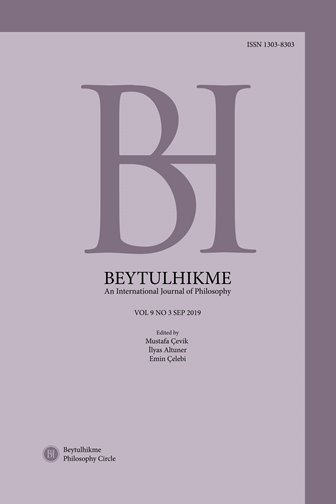Author :
Abstract
Frege’ye göre, anlamlar nesnenin sunum kiplerinden çıkar. Frege’nin teleskop örneğinden hareketle şu ilkeye ulaşırız: Bir şey sunum kipidir eğer ortada bu sunum kipini gerçekleştirecek bir nesne varsa. Fakat, makalede ilerledikçe Frege’nin bir gönderimi olmadığı halde anlamı olan özel isimlerden, yine aynı şekilde bir gönderimi olmadığı halde bir düşünce dile-getiren cümlelerden bahsettiğini görüyoruz. Burada da şöyle bir ilke karşımıza çıkar: Bir sunum kipi olan anlam, gönderimden bağımsızdır. Eğer sunum kipi tanım gereği bir nesnenin ilk önce var olmasını gerektiriyorsa, bu sunum kipinin aynı zamanda nesneden/gönderimden bağımsız olduğunu nasıl söyleyebiliriz? Makalenin ilk bölümünde Frege’nin kuramını merkeze aldığım sorun kapsamında ana hatlarıyla açıklayacağım. İkinci bölümde, Evans ve Beaney’in önerdiği çözüm yollarını açıkladıktan sonra özellikle Beaney’in yaklaşımına Frege-ci bir eleştiri getirmeye çalışacağım. Daha sonrasında, bu sorunun-Frege’nin kuramı çerçevesinden çok fazla uzaklaşmadan-nasıl çözülebileceğini açıklamaya çalışacağım ve kendi çözüm önerimi sunacağım.
Keywords
Abstract
For Frege, sense emerges from modes of presentation of the object. Based on Frege’s telescope example, we have the following principle: Something is a mode of the presentation if there exists an object that realizes that mode of presentation. On the other hand, as we proceed in the article Frege talks about the cases of proper names that have sense without having a reference and similarly sentences that express a thought without having a reference. Here we have the following principle: Sense as a mode of presentation is independent of reference. If a mode of presentation by definition requires the existence of objects beforehand, the article inquires how one can say that the mode of presentation is also independent of object/reference. In the first part of the article, I will sketch the outlines of Frege’s theory within the scope of the central problem. In the second part, after briefly explaining the solution proposed by Evans and Beaney, I will attempt to criticize Beaney’s approach from a Fregean standpoint. Afterward, I will explain-without going too far away from Frege’s conceptual framework-how this problem could be solved and provide my proposal up to the task.
Keywords
- Beaney, M. (1996). Frege: Making Sense. London, U.K.: Duckworth.
- Beaney, M. (Ed.). (1997). The Frege Reader. Oxford: Blackwell Publishers.
- Coffa, Alberto (1993). The Semantic Tradition from Kant to Carnap: to the Vienna Station. (Ed. Linda Wessels). Cambridge; New York: Cambridge University Press.
- Çitil, Ayhan (2002). Kant'ın Transandantal Felsefesinde Schein Kavramının Sinn ve Bedeutung Kavramları ile Temellendirilmesi. Felsefelogos, 19, 87-97.
- Denkel, Arda (1989). Frege’nin Dil Felsefesi: Ana Çizgiler. Felsefe Tartışmaları, 5. Kitap, 24-46.
- Dummett, Michael (1978/1996). Truth and Other Enigmas. Cambridge: Harvard University Press.
- Dummett, Michael (1981a). Frege: Philosophy of Language. Cambridge: Harvard
- Dummett, Michael (1981b). The Interpretation of Frege’s Philosophy. Cambridge: Harvard University Press.
- Dummett, Michael (1996). Frege and Other Philosophers. New York: Oxford Uni- versity Press.
- Evans, Gareth (1982). The Varieties of Reference. (Ed. John McDowell). New York: Oxford University Press.
- Frege, Gottlob (1884/2008). Aritmetiğin Temelleri. (Çev. H. Bülent Go ̈zka ̂n). İstanbul: Yapı Kredi Yayınları.
- Frege, Gottlob (1980). Philosophical and Mathematical Correspondence. (Trans. Hans Kaal, Ed. Gottfried Gabriel, et al). UK: Basil Blackwell.
- Frege, Gottlob (1892/1997). On Sinn and Bedeutung. The Frege Reader. (Ed. Mi- chael Beaney). Oxford: Blackwell Publishers, 151-171.
- Frege, Gottlob (1897/1997). Logic. The Frege Reader. (Ed. Michael Beaney). Oxford: Blackwell Publishers, 227-250.
- Frege, Gottlob (1918/1997). Thought. The Frege Reader. (Ed. Michael Beaney). Oxford: Blackwell Publishers, 325-345.
- Gökel, Nazım (2017). Yalnız Gezerin Temsil Rehberi. Felsefelogos, 65/2, 43-65.
- Gözkan, Bülent (2008). Çevirenin Sunuşu: Frege ve Aritmetiğin Temelleri. Arit- metiğin Temelleri. (C ̧ev. H. Bu ̈lent Gözka ̂n). İstanbul: Yapı Kredi Yayınları, 13-71.
- Gözkan, Bülent (2010). Frege’nin Anlam Kuramının Kökenleri. Anlam Kavramı Üzerine Yeni Denemeler. (Ed. Sibel Kibar, Selma Aydın Bayram & Ayhan Sol). Ankara: Legal Kitapevi, 173-186.
- Grossmann, Reinhardt (1969). Reflections on Frege’s Philosophy. Evanston: North- western University Press.
- Kluge, E. H. W. (1970). Reflections on Frege. Dialogue 9/3, 401-409.
- Kluge, E. H. W. (1980). The Metaphysics of Gottlob Frege: An Essay in Ontological Construction. Netherlands: Springer.
- Topkaya, Rabia. (2019). Sıfır Noktası Olarak Kökenin Ulaşılamazlığı. Kaygı 18/1. 1- 19.
- Yıldırım, Mustafa (2016). Frege’nin Fonksiyon-Argüman Ayrımı ve Genel Öner- melere İlişkin Analizi. Beytülhikme 6/2, 125-141.
